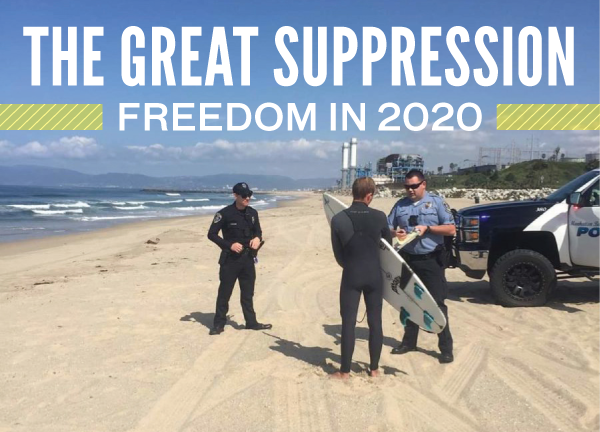
April 2020 saw many Americans stay at home willingly, avoid large gatherings and some even call on government officials to “shut it all down!” due to the rapid spread of the 2019 novel coronavirus.
Others don’t feel like it’s a state governor’s place to distinguish “essential” from “non-essential” businesses and activities, and have the opinion that those who wish to stay at home should do so, but those who wish to gather, to travel, to conduct business, to work out in a gym, should do so freely. Some business owners and free-market supporters said the people who shout to “shut it all down” know not what they ask.
During this pandemic, every state declared a state of emergency, with each governor making some sort of executive decision in regard to modifying schools, businesses, travel and gatherings. All but six states—Arkansas, Iowa, Nebraska, Utah and the Dakotas—implemented an order asking, or requiring, residents to stay home.
In Tennessee, during the month of April, gyms could not operate, restaurants could not host diners inside, state parks were closed and gatherings of 10 or more people were banned.
In light of the rapid spread of the virus and in an effort to take pressure off of healthcare facilities, many Americans willingly reduced their trips to public spaces, and health experts say the banning of mass gatherings and closing of schools helped halt the spread of the virus and flatten the curve. But others felt the restrictions decreed by governors and mayors—in the form of executive orders limiting freedoms of assembly without the validation of legislatures and councils—overstepped the limits of power a single elected official should have. Perhaps the government should require those who have tested positive for COVID-19, or even those who have come in contact with it, to isolate in order to slow the spread and flatten the curve. But why should everyone receive a sentence for house arrest for committing no crime?
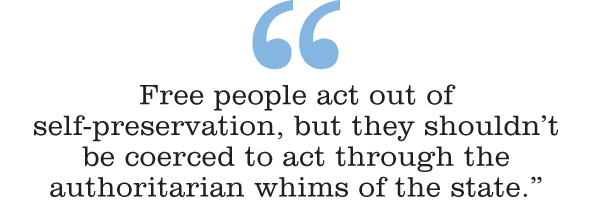
“Free people act out of self-preservation, but they shouldn’t be coerced to act through the authoritarian whims of the state,” David Harsanyi wrote in the National Review in a piece titled “Coronavirus Authoritarianism Is Getting Out of Hand.” “Politicians act as if a health crisis gives them license to lord over the most private activities of America people in ways that are wholly inconsistent with the spirit and letter of the Constitution.”
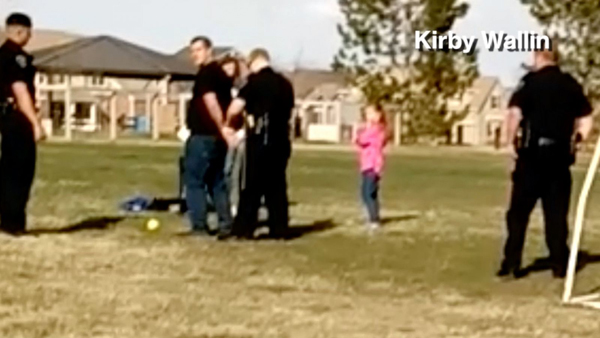
This period of pandemic saw police officers in a town in Colorado detain a father for playing T-ball in a park with his wife and 6-year-old, allegedly violating a COVID-19-related order. The father (who was a former law enforcement officer himself) said the family was in an open space in the park, socially distant from all other people, until the officers came nearby. The police did not hold the man for long, and the city soon issued an apology, but the father said that being placed into a police car in handcuffs in front of his 6-year-old was outrageous and never should have occurred.
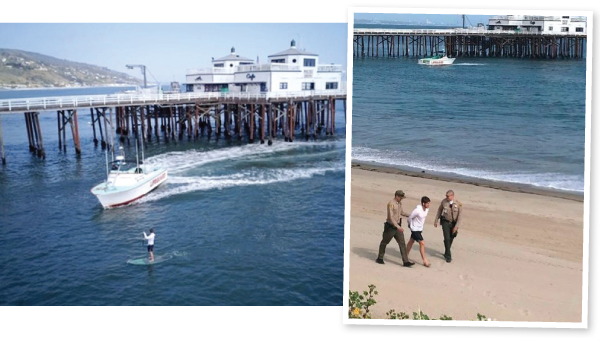
A paddle-boarder made waves in California as officers placed him under arrest for violating stay-at-home orders after he rode his board in the ocean, again, very far away from other human beings until police got into his six-foot personal space zone.
A few golfers from Massachusetts, unable to play a round in their home state, traveled to a golf course in Rhode Island for a round of golf on a spring day. This activity resulted in arrest, violating a Constitutionally-iffy order in the state limiting play on Rhode Island golf courses to only residents of the state, after a Rhode Islander reported the out-of-state license plate.
Police in Philadelphia dragged a man off of a bus for failure to wear a face covering.
While these incidents are isolated and extreme examples, the responses can illustrate a significant divide in national perspective. Some Americans seem to think that the government should restrict almost anyone from even venturing outside. Others on the other extreme say that the slightest adjustment to business or travel from a governor or mayor is an unlawful and un-American infringement of liberty.
“States and localities have fairly broad police powers, recognized in the 10th Amendment, over issues of health and safety. Such powers are similar to those that allow for compulsory vaccinations, which the Supreme Court has upheld,” according to John Vile, Constitutional Historian with the MTSU Free Speech Center and the Chair of the MTSU Department of Political Science at MTSU and Dean of the University Honors College. “Laws generally need to be phrased in general fashion, so as to avoid due process challenges.”
But what if restrictions extend beyond recreational rights and seep into the sacred and Constitutionally-protected free exercise of religion.
A pastor in Florida faced criminal charges after encouraging worshipers to attend church services, which law enforcement interpreted as being in violation of a state emergency order banning mass gatherings.
“in times of genuine public health crises, churches, synagogues and mosques are no more exempt from neutral and generally applicable laws designed to protect health than are any other institutions,” Vile said.
Another high-profile situation involving church services during the pandemic occurred in the town of Greenville, Mississippi.
Here, the mayor issued an order specifically geared towards churches “that orders all church buildings closed for in-person and drive-in church services.”
The city police officers subsequently handed out $500 tickets to those in their cars attending a drive-in service.
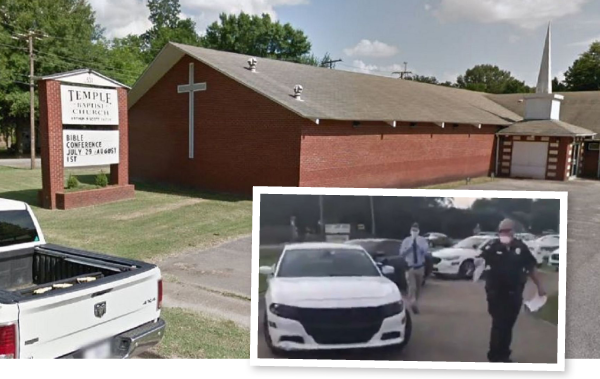
“On April 8, Pastor Arthur Scott preached God’s Word from an empty church building. He spoke into a microphone connected to a low-power FM transmitter. Attendees were able to park outside the building and tune in . . . this was just about as CDC-compliant as any church service could be,” said John Harding, communications specialist with the Alliance Defending Freedom, a religious rights group that filed a lawsuit against the city of Greenville on the behalf of Temple Baptist Church and its supporters.
“But as they listened to the sermon, eight uniformed police officers arrived at the parking lot and handed out $500 fines. Clearly, the City of Greenville is unconstitutionally singling out churches,” Harding continued. “As these churchgoers were being ticketed, Greenville residents all over town waited in restaurant parking lots for their meals to arrive. They sat in their cars, rolled down their windows, and received hand-delivered food. No tickets were issued in these cases.”
The Governor of Mississippi, Tate Reeves, spoke out in support of the church as well.
“We ordered churches safe from these outrageous actions. Don’t trample the constitution,” Gov. Tate tweeted after the police issued the tickets to the Temple Baptist churchgoers.
Vile said he would “be very surprised” if a judge found the order by the Greenville mayor to be constitutional.
“It seems to violate the principle of religious neutrality by treating drive-through churches differently than drive-through restaurants,” Vile said, but pointed out that government officials, law enforcement, churchgoers and many others have a role to play in curbing this public health situation that has the potential to affect so many.
“Just as some churches give others a bad name by flouting religious liberty in a manner to jeopardize public health, so too, Barney Fife law enforcement can give a bad name to legitimate governmental public health concerns.”
As protesters request that governors ease restrictions on businesses, lawsuits regarding uncustomary arrests during the COVID panic unfold, businesses attempt to reopen, and millions of Americans decide whether to return to work and public life or to shelter in place, the social, legal, financial and political ramifications of this unprecedented time in American history will continue to reveal themselves over the coming months.














[…] • Dr. John Vile, dean of the University Honors College and Constitutional scholar, addressed challenges to civil liberties posed during the COVID-19 pandemic for a May 7 article in the Murfreesboro Pulse. His comments can be read here. […]
Pingback May 15, 2020 @ 9:43 pm